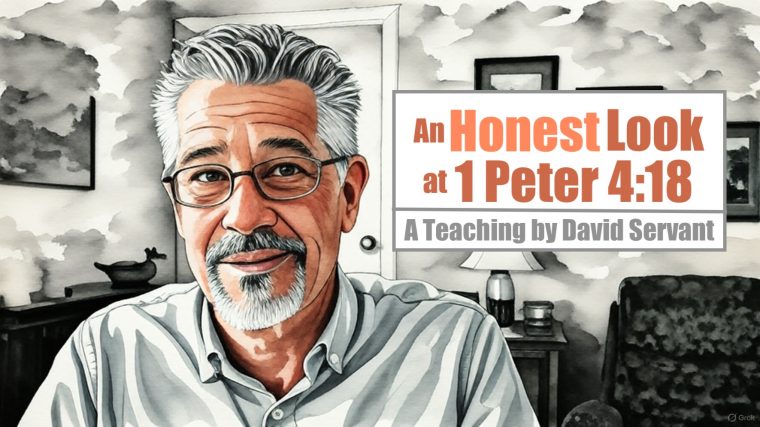
And if the righteous scarcely be saved, where shall the ungodly and the sinner appear? (1 Pet. 4:18, KJV).
And if it is with difficulty that the righteous is saved, what will become of the godless man and the sinner? (NASB).
Peter indicated that there are two categories of people, the righteous and the unrighteous. The latter he describes as “godless” and “sinners.”
It would be absurd to imagine that the “righteous” of whom Peter wrote are people who are just legally righteous but who are every bit as much sinners as the ungodly. Clearly, Peter was contrasting people who live righteously, that is, people who are holy and obedient to God, with people who don’t live righteously, that is, ungodly sinners.
If he was only referring to a legal righteous that the righteous possess due to Christ’s sacrifice, he would NEVER have declared that such righteousness “scarcely saves” people. That would be a huge insult to Christ’s sacrifice.
So let us be honest.
Peter plainly declared that there is no hope for the ungodly and sinners to be saved. And the reason? It is because righteous people are saved “with difficulty.” Or, as the King James Version says, “the righteous [can] scarcely be saved.” That leaves no hope for the ungodly and sinners.
Additionally, it is clear that Peter was referring to future salvation, because he certainly believed—as does anyone who knows the gospel—that any ungodly sinner can be saved if he/she repents and believes in the Lord Jesus. Remember that the author of 1 Peter 4:18 once declared—as a crusty fisherman—that he himself was a “sinful man” (Luke 5:8). But he experienced God’s gracious forgiveness and transformation. Therefore, when Peter wrote that there is no hope for the ungodly and sinners to be saved, he must have been referring to ungodly sinners who don’t repent and believe in the Lord Jesus and who thus continue sinning. Again, there is no hope for them to be saved in the end, proven by the fact that people who do live righteously are “scarcely saved.”
If you can be honest with 1 Peter 4:18, you will do better than many professing Christian pastors who are always advocating the idea that people can somehow be legally righteous even if they are not living righteously. The apostle John similarly annihilated that heresy—also prevalent in his day—by writing:
If you know that He is righteous, you know that everyone also who practices righteousness is born of Him…. Little children, make sure no one deceives you; the one who practices righteousness is righteous, just as He is righteous (1 John 2:29, 3:7).
The good news is that God’s gift of righteousness, which He graciously grants to believers, is much more than a righteousness that releases us from guilt for all our “former sins” (2 Pet. 1:9) wiping our slate clean. God’s gift of righteousness also frees us from slavery to sin (Rom. 6:6-20), delivers us from the domain of darkness (Col. 1:13, 2:15), recreates our spirits (Tit. 3:5), and blesses us with the indwelling Holy Spirit (1 Cor. 6:19), who obviously comes to live in us to make us holy. All of those blessings are part of God’s gift of righteousness.
That being said, God doesn’t take away our free will or our capacity to sin. So, if we are to actually live righteously, it requires our cooperation and effort. God’s marvelous gift of righteousness is comparable to the talent that the master gave to each of his three slaves in Jesus’ Parable of the Talents. They were entrusted with something they didn’t earn and that was not their own. But they were responsible to do something with that free gift! They were responsible to invest it in order to bring a return to their master. In the end, they had to give an account. That is Christianity 101.
Although it is quite popular for modern professing Christians to believe that Jesus’ sacrifice locks in their guaranteed future salvation regardless of how they live their lives, 1 Peter 4:18 teaches otherwise. Only those who live righteously will be saved in the end. And 1 Peter 4:18 agrees with what the rest of the New Testament repeatedly affirms—if we are honest.
For example, Jesus once told His followers: “Unless your righteousness surpasses that of the scribes and Pharisees, you will not enter the kingdom of heaven” (Matt. 5:20). That warning is contained in Jesus’ Sermon on the Mount, a sermon that was all about how His followers needed to live their lives if their righteousness was to exceed that of the scribes and Pharisees.
Anyone who claims that Jesus was hinting about a legally-imputed righteousness (that would be available in three years) and that would supersede the practical righteousness of the scribes and Pharisees, is either grossly ignorant or patently dishonest. Again, only people who are holy will inherit God’s future kingdom, just as Jesus declared in the same sermon: “Not everyone who says to Me, ‘Lord, Lord,’ will enter the kingdom of heaven, but he who does the will of My Father who is in heaven will enter” (Matt. 7:21).
And for those heretics who claim that Jesus’ words have no application to new covenant believers because He was ministering to Jews under the new covenant, Paul had very stern words: “If anyone advocates a different doctrine and does not agree with sound words, those of our Lord Jesus Christ, and with the doctrine conforming to godliness, he is conceited and understands nothing” (1 Tim. 6:3, emphasis added). So those who claim that Jesus’ words have no application to new covenant believers actually “understand nothing.” Zero. I guess you could say that they are idiots.
Like Jesus, Paul believed that heaven was only for the holy. He wrote, “Do you not know that the unrighteous will not inherit the kingdom of God?” (1 Cor. 6:9, emphasis added).
Lest anyone imagine that he was speaking of those who have not “received a legal righteousness that has nothing to do with actually living righteously,” Paul then continued by listing people who are unrighteous: “Do not be deceived; neither fornicators, nor idolaters, nor adulterers, nor effeminate, nor homosexuals, nor thieves, nor the covetous, nor drunkards, nor revilers, nor swindlers, will inherit the kingdom of God” (1 Cor. 6:10).
And lest anyone think that Paul was saying that such unrighteous people cannot repent, change their behavior, become righteous, and inherit God’s future kingdom, he then wrote, “Such were some of you; but you were washed, but you were sanctified, but you were justified in the name of the Lord Jesus Christ and in the Spirit of our God” (1 Cor. 6:11).
Paul also wrote to the Romans something that is not believed by most professing Christians:
But because of your stubbornness and unrepentant heart you are storing up wrath for yourself in the day of wrath and revelation of the righteous judgment of God, who will render to each person according to his deeds: to those who by perseverance in doing good seek for glory and honor and immortality, eternal life; but to those who are selfishly ambitious and do not obey the truth, but obey unrighteousness, wrath and indignation. There will be tribulation and distress for every soul of man who does evil, of the Jew first and also of the Greek, but glory and honor and peace to everyone who does good, to the Jew first and also to the Greek (Rom. 2:5-10).
Do those words fit into your theology? If they don’t, your theology needs major adjustment!
Imagine reading all the passages I’ve cited in this short teaching and still claiming that anyone who says that there is a standard of practical righteousness required for inheriting God’s future kingdom is “preaching a false gospel of works”! If that were true, Jesus, Peter, John and Paul all preached a “false gospel of works.” Personally, I’m sticking with them!


